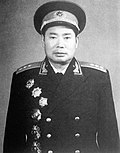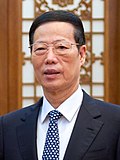

The politics of Shandong in the People's Republic of China is structured in a dual party-government system like all other governing institutions in mainland China.
Contents
- List of the CCP Shandong Provincial Committee secretaries
- List of governors of Shandong
- List of chairmen of Shandong Provincial People's Congress
- List of chairmen of the CPPCC Shandong Provincial Committee
- References
The Governor of Shandong is the highest-ranking official in the People's Government of Shandong. However, in the province's dual party-government governing system, the Governor has less power than the Shandong Chinese Communist Party (CCP) Provincial Committee Secretary, colloquially termed the "Shandong CCP Party Chief".














